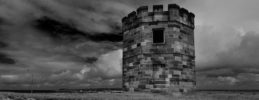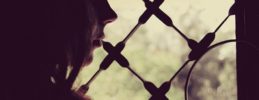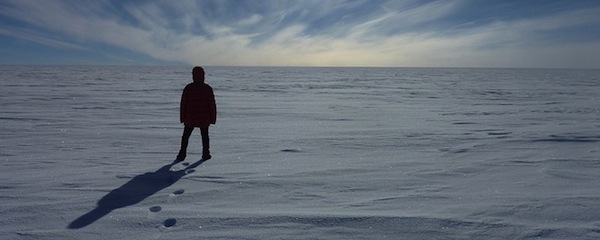
('Antarctica' © Eugene Kaspersky, 2007)
ANTARCTICA
by DORA D’AGOSTINO
I was twelve when Mrs. Purl, an alias, vacated the apartment above us, to go live with her daughter. Her parting gifts, before she left, were some poetry books and a short story anthology that very quickly captivated me. I have to thank her for my subsequent love of literature, and the short story form in particular. She was, to my family, someone I shouldn’t emulate: she was an artist, owned a piano, she played, she sang and her apartment was full of books – the kind that were disdained by my family. In their eyes, those books were subversive for they encouraged laziness and rebellion. The only functional purpose they served was to allow us to learn the English language so we could fit in, make an honest living, and achieve the American dream. The voices they depicted and what they represented were dangerous to our immigrant way of life. The idea that a daughter of theirs would want to spend her time making up stories by imagining this or that was not something they wished for and they despaired for my future.
Soon after, I remember reading Edgar Allen Poe. His stories were always one breath away from disaster, with names like ‘The Tell Tale Heart’, ‘The Pit and the Pendulum’, and ‘The Premature Burial’. These were followed by the greats: Chekov, Joyce, Mansfield, Parker and Hemingway, to name a few. And I owe it all to Mrs. Purl’s kindness for opening the door to great literature. I’ll never forget it.
Today, The Best American Short Stories 2014, edited by Jennifer Egan is the latest collection on my nightstand. ‘Antarctica’, by Laura van den Berg, is the last story in the collection, and it captured my imagination. The more I read, the more it reminded me of Edgar Allen Poe‘s ‘The Narrative of Arthur Gordon Pym of Nantucket’.
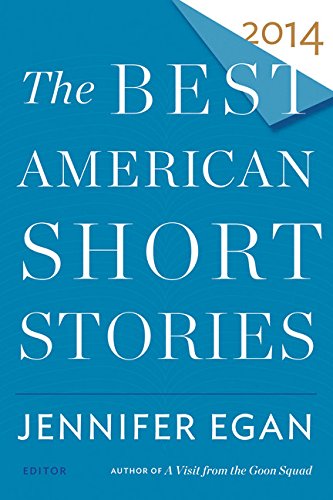 On the surface, the subject matter is very different. However, though I read Poe’s story a long time ago, I do remember that Pym undertakes a symbolic and literal voyage to find himself, as does Lee, the protagonist in ‘Antarctica’. As I read, I couldn’t help but think that, though years and continents may separate us, artists are still inspired by death, grief, heartache, loss, joy, surprise, birth, and everything in-between to create something new that speaks directly to us. I’ve heard it said, and I paraphrase, that there’s nothing new under the sun to write about; the thematic similarities between Poe and van den Berg’s stories shows this is certainly true. It is the artists’ job to breathe new life into a subject to make us see it in a new light.
On the surface, the subject matter is very different. However, though I read Poe’s story a long time ago, I do remember that Pym undertakes a symbolic and literal voyage to find himself, as does Lee, the protagonist in ‘Antarctica’. As I read, I couldn’t help but think that, though years and continents may separate us, artists are still inspired by death, grief, heartache, loss, joy, surprise, birth, and everything in-between to create something new that speaks directly to us. I’ve heard it said, and I paraphrase, that there’s nothing new under the sun to write about; the thematic similarities between Poe and van den Berg’s stories shows this is certainly true. It is the artists’ job to breathe new life into a subject to make us see it in a new light.
There is so much I admire and relate to in ‘Antarctica’. It is a story of grief and loss and how we may or may not come to terms with it. Lee is driven to Antarctica on a quest to uncover the mysterious circumstances of her brother‘s disappearance. He was a scientist who travelled to Antarctica to conduct research on seismic activity. When we first meet Lee, she’s in denial and grief-stricken. Later, we find out she‘s also racked with guilt. As the story progresses, van den Berg methodically alternates between the past and present to highlight the fact that Lee is almost clueless when it comes to knowing anything about herself, least of all her brother and his wife, Eve. Lee, as a character, is not self-directed: she is content living in her brother’s shadow, and only gets married and has a life of her own when her brother moves to Antarctica. She is, what armchair psychologists would call today, co-dependent, living under the same roof as her brother and his new wife.
Her voyage to Antarctica symbolises her own voyage of discovery, as mysterious and unreachable as that cold and forbidden continent she visits. The author makes it clear that Lee is afraid of what she‘ll find: ‘It was like standing in the middle of a white sea – ice in all directions, stretching into infinity […] The thought of venturing any farther was suddenly terrifying.’
In a matter-of-fact style, Lee details the grim reality of having to identify her brother: ‘All that remained of my brother was a stainless steel watch… the rescue crew had also uncovered an unidentified tibia, which might or might not have belonged to him.’ She speaks of Antarctica and how ‘much of it was still unexplored’, much like her own emotions.
The story hinges on the secrets we keep and what these secrets do to human relationships. Lee’s guilt centers on having kept a secret from her brother. It is this guilt that propels her to explore Antarctica for her brother’s remains but to also come to terms with her own inadequacies. We are told that they are orphaned, their parents having died in a car accident. The brother continues to remain unnamed, but it seems that though they were both well cared for, with ‘grandparents who raised us, and an inheritance’, cracks are now starting to appear: ‘We went weeks without doing laundry. My brother wore the same striped polos and rumpled khakis; I showed up for class with unwashed hair and dirty socks.’ It also seems her brother began to obsess ‘about P-waves and S-waves. Fault lines and ruptures’. Then her sister-in-law, Eve, appears in the narrative. The author alludes that all three kept secrets from each other, and despite being so bright, so accomplished – her brother went to 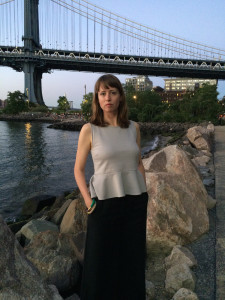 MIT where he met Eve; Lee studied Astronomy – their emotions are all stunted, as Lee states: ‘because even though we had been close, we never really learned how to talk to each other.’ Van den Berg mentions this a number of times. One minute she says the siblings were close, the next ‘we had not spoken in over a year’. It’s obvious that vast emotional distances kept them apart. The one person who could, perhaps, bring them closer is Eve, but she has her own secret that only serves to alienate them even further, and the author gives us hints that Eve is as broken as the siblings are: ‘only this time I caught the sadness in her voice’.
MIT where he met Eve; Lee studied Astronomy – their emotions are all stunted, as Lee states: ‘because even though we had been close, we never really learned how to talk to each other.’ Van den Berg mentions this a number of times. One minute she says the siblings were close, the next ‘we had not spoken in over a year’. It’s obvious that vast emotional distances kept them apart. The one person who could, perhaps, bring them closer is Eve, but she has her own secret that only serves to alienate them even further, and the author gives us hints that Eve is as broken as the siblings are: ‘only this time I caught the sadness in her voice’.
Only once does Lee give in to her emotions and cry, and even then the narrator says she ‘didn’t realize it was happening until I felt moisture on my cheeks’. Later, Lee does all she can to symbolically protect herself from the uncomfortable emotions that have arisen when she speaks of the first time she steps out on the ice once she‘s in Antarctica, at the mercy of the elements: ‘Arrows pointed to what kind of layer should cover each part [of the body], to avoid frostbite.’ At this point in Lee’s story, I felt doubtful that Lee would ever reach the emotional catharsis that affects change.
Lee’s journey also demonstrates that experiences shape us, and how we will never know how we will act until tested. When Lee finally visits the last place her brother was thought to have been, she makes a discovery:
I picked up something the size of a quarter. I wasn’t sure what it had been before; the fire had made it glossy and flat. I slipped it into my pocket and kept walking. I told myself it was evidence; I just didn’t know what kind.
Here, I felt that Lee may have a chance to reach an emotional catharsis, for better or worse. She is finally questioning her relationship with her brother, and perhaps the world at large.
I love how the story intertwines the past and present, how it uses the barren and icy surroundings of Antarctica effectively to chart an emotional landscape so difficult to embody. Van den Berg also manages to keep our interest throughout, even with a character like Lee who is apathetic, and comes across so flat on the page.
The story still haunts me, and is so rich with symbolism that I can keep writing about it as one association sparks another! Like all great stories, I also learned something of myself: these are the kind of stories I gravitate to. Linear and plain stories don’t hold much fascination for me, perhaps because I too am searching, still trying to make sense of the person I’ve become.
I also admire the honesty that shone throughout. The author seems to suggest that knowledge can sometimes separate us, not bring us closer, and this poses the question: how well do we really know each other? We are all wounded in our ways, but is there something we can do to not become so alienated and lonely? What are we willing to give up? The choices we make may not all pan out, or work in our favor, so, unfortunately, there may always be regrets. The sad truth that Lee finally accepts is that sometimes we fail others and we don’t know why. Like any great literature, the story has us questioning our own beliefs and keeps resonating long after we’ve read it. Much like a Rorschach test, we’ll see something new after each reading. I can’t wait to pick it up again.
~
 Dora D’Agostino loves to write and read about writing. Due to a twist of fate, a life in Academia was not to be. Joining Thresholds was the next best thing, allowing her to discover new writers and to participate in inspiring and lively discussions. She is currently working on a coming of age novel that takes place in Italy during the late 50’s and a number of short stories. Her job keeps her busy so she writes mostly on weekends.
Dora D’Agostino loves to write and read about writing. Due to a twist of fate, a life in Academia was not to be. Joining Thresholds was the next best thing, allowing her to discover new writers and to participate in inspiring and lively discussions. She is currently working on a coming of age novel that takes place in Italy during the late 50’s and a number of short stories. Her job keeps her busy so she writes mostly on weekends.
